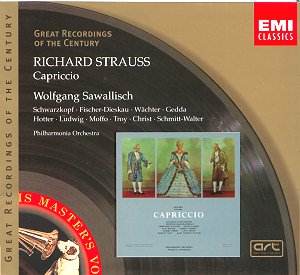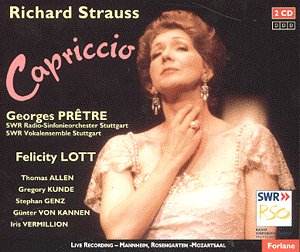Richard
STRAUSS
Capriccio
 Schwarzkopf, Fischer-Dieskau,
Wächter, Gedda, Hotter, Ludwig, Moffo, Troy, Christ, Schmitt-Walter
Philharmonia Orchestra, Wolfgang Sawallisch
Schwarzkopf, Fischer-Dieskau,
Wächter, Gedda, Hotter, Ludwig, Moffo, Troy, Christ, Schmitt-Walter
Philharmonia Orchestra, Wolfgang Sawallisch
 EMI Great Recordings of
the Century CMS5 67394 2 2 discs [61'53 & 73'02], Mid Price
EMI Great Recordings of
the Century CMS5 67394 2 2 discs [61'53 & 73'02], Mid Price
 Lott, Allen, Kunde, Genz,
Von Kannen, Vermillion, Pürgstaller, Lüdermann, Gonzalez, Klink
SWR Radio-Sinfonieorchester Stuttgart, Georges
Prêtre
Lott, Allen, Kunde, Genz,
Von Kannen, Vermillion, Pürgstaller, Lüdermann, Gonzalez, Klink
SWR Radio-Sinfonieorchester Stuttgart, Georges
Prêtre
 Forlane 268052 2 discs
[74'40 & 69'06], Full Price
Forlane 268052 2 discs
[74'40 & 69'06], Full Price

Richard Osborne's excellent booklet note to EMI's remastered Capriccio quotes
Glenn Gould as having said this opera was the ultimate response to philosophic
repose, equal only to the late Beethoven string quartets. There is validity
in this and the comparison with the late Beethoven quartets is more than
apt given the delicacy (even sparseness) of the orchestral scoring (the work
opens with a string sextet), more akin to the Strauss of Metamorphosen than
any of his preceding operas. However, this is precisely the reason why great
recordings of this work are few and far between.
Capriccio requires not only superlative singers it also requires singers
who can get beneath Strauss' operatic intentions: the philosophy of the work
demands more empathy from its principals than perhaps any other opera. It
is a conversation piece (sprechgesang is an important element), perhaps more
akin to the drawing room than the vastness of an opera house. It is also
a work that is more about the nature of opera than about drama: the work's
dullness for many is understandable. On stage it can be a thrillingly personal
experience - as can the late Beethoven quartets - where so much of the effect
is determined by the audience's interaction with the artists. On disc, it
can be, and often is, a failure.
The Sawallisch recording is famous but perhaps not as great as many have
claimed. It does have superb casting, Elizabeth Schwarzkopf being particularly
fine in the role of the Countess. But the fine casting is partly the drawback
- particularly among the male leads. Like Cosi fan Tutti, Capriccio is above
all an ensemble piece and this recording is more than troubled by the clashes
of timbre inherent in the voices of Fischer-Dieskau, Hotter and Gedda.
Unfortunately for EMI their new transfer exacerbates this with the voices
oscillating more violently than on the original LPs. The orchestra, superbly
balanced on vinyl, here seem more remote than ever. This is a particular
pity for the Philharmonia are angelic in phrasing and tone.
Another problem for many might be the darkness that seems to dominate much
of the first act. The humanity and beauty of the work do seem understated,
particularly when one compares it with the Prêtre performance. The
work is undeniably melancholic, set as it is in a nostalgic, pre-war tone-world,
but the Sawallisch performance is almost burdened by a deliberate funerealness.
Compare this with Karl Böhm's beautifully sensitive account (DG 445
347-2GX2) and the differences become very striking indeed.

The Prêtre performance was recorded live in 1999 and is worth hearing
almost solely for Felicity Lott's Countess. The opening Sextet could not
be more different from Sawallisch's, driven as it is by a directness that
makes it less serene than usual. If anything, the balance and volume of
Prêtre's male leads are more problematical than in the EMI recording.
Thomas Allen is an imperious Count, but Günther von Kannen, normally
a sensitive singer, is here miscast. The effect is less conversational and
more argumentative. This becomes a real problem in the sextets and octets
where the voices are not as unanimously toned and phrased as one would ideally
like.
Böhm's recording may have more autumnal warmth to it than either of
those under review (and a greater understanding of Strauss' passing regret
in this his operatic swansong) but it ultimately falls short of real greatness
because of his Countess, Gundula Janowitz. Hers is the peachiest of voices,
but here she is imprecise in diction and she is not as characterful as either
Schwarzkopf or Lott in conveying the innate beauty of this role. The final
scene, one of the most achingly beautiful in all opera, is where Janowitz'
shortcomings are most cruelly exposed and where Lott is particularly fine.
The delineation of tone and dynamics is truly memorable, the subtlety of
expression more dewy-eyed and irresistible than either of her rivals.
Prêtre conducts a marvellously fluid account of the Final Scene, as
do both Sawallisch and Böhm, but his is perhaps the more beautiful because
of Lott's singing. Where Schwarzkopf is mannered, Lott is almost alone in
balancing the radiance of the text against the lush orchestral backdrop.
This is singing without any affectation.
Capriccio is a complex opera to follow. With its sextets, septets and octets,
as well as multifarious ensembles elsewhere, it requires the clearest of
librettos. The EMI booklet is a model of its kind with the complexity easy
to follow in duel text. The Forlane libretto, however, is a disaster. Not
only are the texts divided by language, there is also no indication whatsoever
as to which characters are singing together in which scenes. If you purchase
this set you will either have to have another libretto at hand or to know
the work literally inside out. Its use is minimal and a waste of space.
The ideal Capriccio has not yet been recorded (and probably never will) so
choice is very much down to personal taste. Ideally, one would have Böhm's
unmatched understanding and pacing of the opera and his balanced trio of
male leads with Prêtre's Felicity Lott as the Countess, and Sawallisch's
magnificent Philharmonia. Prêtre's performance will be preferable for
many because of the sound and balance, but I would not be without Sawallisch
on LP. EMI's transfer is not a great success so I would recommend sampling
it before purchasing.
Marc Bridle
Sawallisch - 
Prêtre - 
